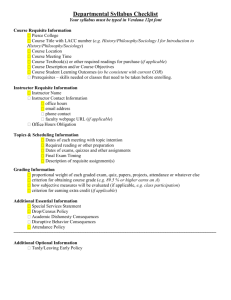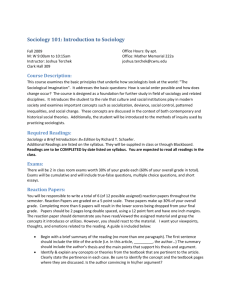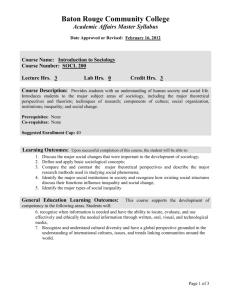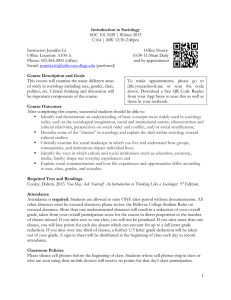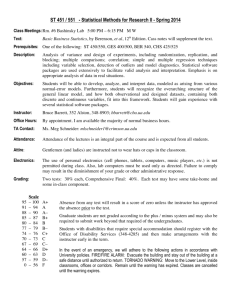SOCI 151 – INTRODUCTION TO SOCIOLOGY Instructor: K. Brad Ott
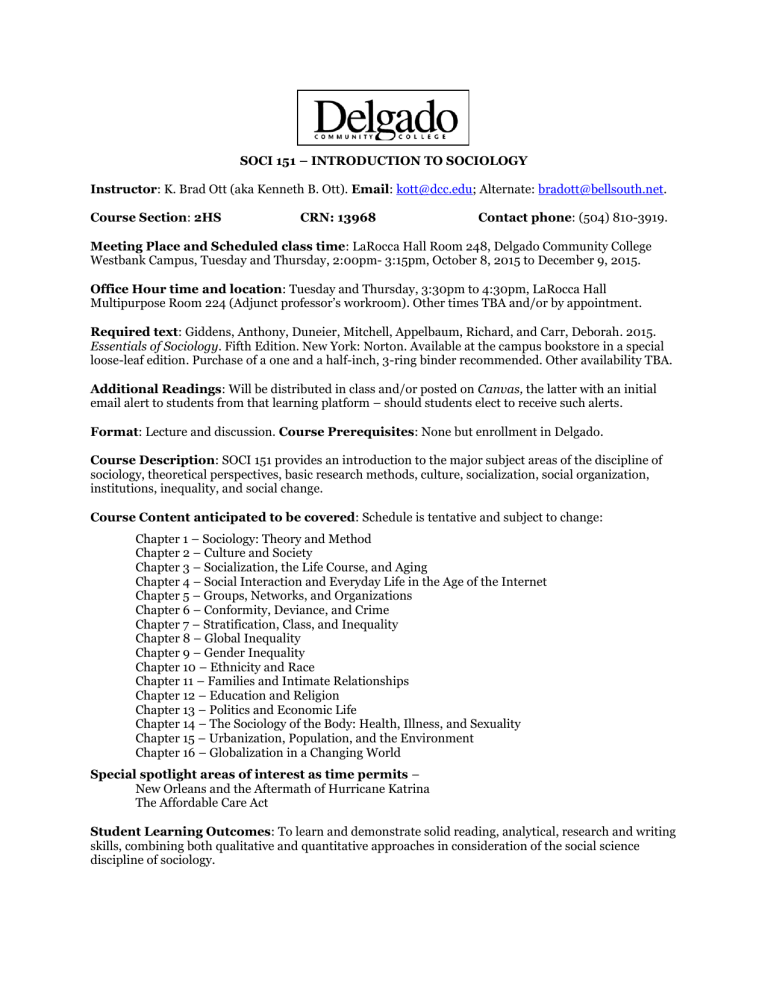
SOCI 151 – INTRODUCTION TO SOCIOLOGY
Instructor : K. Brad Ott (aka Kenneth B. Ott). Email : kott@dcc.edu
; Alternate: bradott@bellsouth.net
.
Course Section : 2HS CRN: 13968 Contact phone : (504) 810-3919.
Meeting Place and Scheduled class time : LaRocca Hall Room 248, Delgado Community College
Westbank Campus, Tuesday and Thursday, 2:00pm- 3:15pm, October 8, 2015 to December 9, 2015.
Office Hour time and location : Tuesday and Thursday, 3:30pm to 4:30pm, LaRocca Hall
Multipurpose Room 224 (Adjunct professor’s workroom). Other times TBA and/or by appointment.
Required text : Giddens, Anthony, Duneier, Mitchell, Appelbaum, Richard, and Carr, Deborah. 2015.
Essentials of Sociology . Fifth Edition. New York: Norton. Available at the campus bookstore in a special loose-leaf edition. Purchase of a one and a half-inch, 3-ring binder recommended. Other availability TBA.
Additional Readings : Will be distributed in class and/or posted on Canvas, the latter with an initial email alert to students from that learning platform – should students elect to receive such alerts.
Format : Lecture and discussion. Course Prerequisites : None but enrollment in Delgado.
Course Description : SOCI 151 provides an introduction to the major subject areas of the discipline of sociology, theoretical perspectives, basic research methods, culture, socialization, social organization, institutions, inequality, and social change.
Course Content anticipated to be covered : Schedule is tentative and subject to change:
Chapter 1 – Sociology: Theory and Method
Chapter 2 – Culture and Society
Chapter 3 – Socialization, the Life Course, and Aging
Chapter 4 – Social Interaction and Everyday Life in the Age of the Internet
Chapter 5 – Groups, Networks, and Organizations
Chapter 6 – Conformity, Deviance, and Crime
Chapter 7 – Stratification, Class, and Inequality
Chapter 8 – Global Inequality
Chapter 9 – Gender Inequality
Chapter 10 – Ethnicity and Race
Chapter 11 – Families and Intimate Relationships
Chapter 12 – Education and Religion
Chapter 13 – Politics and Economic Life
Chapter 14 – The Sociology of the Body: Health, Illness, and Sexuality
Chapter 15 – Urbanization, Population, and the Environment
Chapter 16 – Globalization in a Changing World
Special spotlight areas of interest as time permits –
New Orleans and the Aftermath of Hurricane Katrina
The Affordable Care Act
Student Learning Outcomes : To learn and demonstrate solid reading, analytical, research and writing skills, combining both qualitative and quantitative approaches in consideration of the social science discipline of sociology.
Student Assessment and Evaluation : There will be (1) Learning Checks, take-home and in-class open-book and note assignments covering lectures, discussions and text chapter(s) and supporting materials; (2) Chapter Comprehensives quizzes comprised of groups of text chapters, and (3) A final comprehensive exam, final research paper or field research project. Dates for assignments and quizzes will be announced in class. Any course changes will also be announced in class and posted on Canvas .
Grade Determination : A student’s final grade will be based upon her or his ability to meet course objectives by the end of the semester. Grades will be based upon class participation (including attendance!),
Learning Checks, Chapter Comprehensives, and the final paper, project or final exam. All grades will be in accordance with the standard scale: A=90-100/excellent; B=80-89/above average; C=70-79/average;
D=60-69/barely passing; F=59 or below/failure. Please consult your College Catalog to review other policies, including specific dates for course withdraw, add and drop.
Student attendance: Absences can also impact a student’s final grade. This aspect is particularly vital for this Second Start section, as we will be considering a full semester of work in half the time – so your regular attendance is essential! Excellent / good attendance earns a student compensatory points towards application on coursework. Leaving class early, except for an emergency and/or without prior notification of the instructor, will be considered a class absence. If you need to be absent, it is better to inform the instructor via email or by phone about possible absences, emergencies, and needed schedule adjustments. Students remain responsible for any missed coursework in case of absence.
Statement for Disability Services : It is the general policy of Delgado Community College to assure equal opportunity for all qualified persons. Reasonable accommodation for qualified persons with disabilities will be made provided the students have self-identified with the Office of Disability Services and have provided required documentation. Individual instructors will modify the methods, requirements, and procedures of courses and examinations appropriately to accommodate the special needs of students with disabilities, provided the academic integrity of the course or examination is not violated, and the health and welfare of all students are safeguarded. No accommodations will be made without "letters of accommodations" from the Office of Disability Services. See College Catalog for more information.
Academic Honesty Statement: Delgado Community College requires that students adhere to the highest standards of academic integrity. Students are entrusted to be honest in every phase of their academic life and to present as their own work only that which is genuinely theirs. Cheating, plagiarism, violation of test conditions, complicity in dishonest behavior, or other falsification of academic work is a serious breach of College standards.
Plagiarism is defined as any attempt to represent the work of another as one's own original work. More specifically, plagiarism is the direct appropriation of the language, thoughts or ideas of another--either literally or in paraphrase--without appropriate notation on the source and in such fashion as to imply that the work is one's own original work. Depending upon the nature of the case, a student guilty of academic dishonesty may receive penalties ranging from a grade of "F" for the work submitted to expulsion from the
College. Such penalties may be of both an academic and disciplinary nature. Please see the College
Catalog for additional information.
Atmosphere of Mutual Respect and Courtesy Expected : For the maintenance of a conducive intellectual and educational atmosphere, consideration of our personal and collective integrity is expected. This includes the use of electronic devices during class, holding side conversations, excessive tardiness, and interruptions while others are speaking. Please place cell phones on vibrate or short sound while in class; calls and texts should be answered only in case of emergency (take your conversation outside of class). Please confer with the instructor in advance if possible about anticipated absences.
E-Mail communication with the instructor : 1) Always include a subject line; 2) Be careful in the wording of email, including the use of capital letters and ‘emoticons’ (please don’t overuse); 3) Use standard fonts; 4) Do not send large attachments without advance permission; 5) Assignments should be in MS Word files; 6) E-mail is not a substitution for class attendance .
Syllabus updates and changes : This syllabus is subject to change at the Instructor’s discretion.
However, all enrolled students will be notified of changes in class and via email and/or Canvas .
